Medical Ethics and Henrietta Lacks: A Case Study Analysis
VerifiedAdded on 2023/01/19
|5
|961
|85
Essay
AI Summary
This essay delves into the critical medical ethics issues surrounding the Henrietta Lacks case, focusing on the extraction, distribution, and commercial use of her cells (HeLa cells). It examines the lack of informed consent, patient exploitation, and privacy breaches that occurred, highlighting the historical context and the absence of established ethical guidelines at the time. The essay explores the impact of these actions on Henrietta Lacks' family and emphasizes the importance of informed consent, respect for patient privacy, and the ethical handling of biospecimens in research and commercial applications. It underscores the need for regulations to protect human dignity and ensure ethical practices in the field of medical research, particularly in the context of the development of multi-billion dollar industries based on HeLa cells. The conclusion reinforces the significance of the case in shaping current bioethical principles.
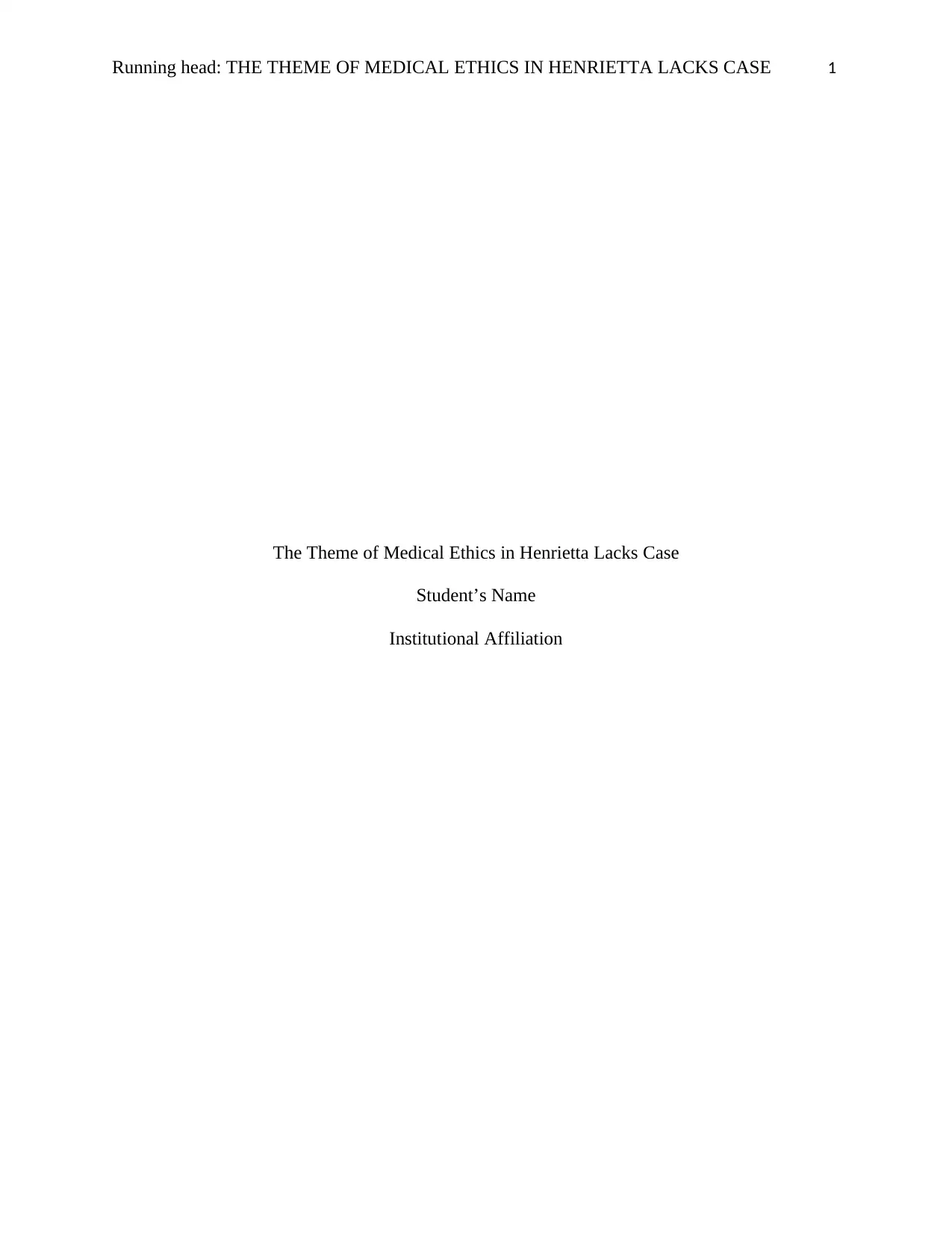
Running head: THE THEME OF MEDICAL ETHICS IN HENRIETTA LACKS CASE 1
The Theme of Medical Ethics in Henrietta Lacks Case
Student’s Name
Institutional Affiliation
The Theme of Medical Ethics in Henrietta Lacks Case
Student’s Name
Institutional Affiliation
Paraphrase This Document
Need a fresh take? Get an instant paraphrase of this document with our AI Paraphraser
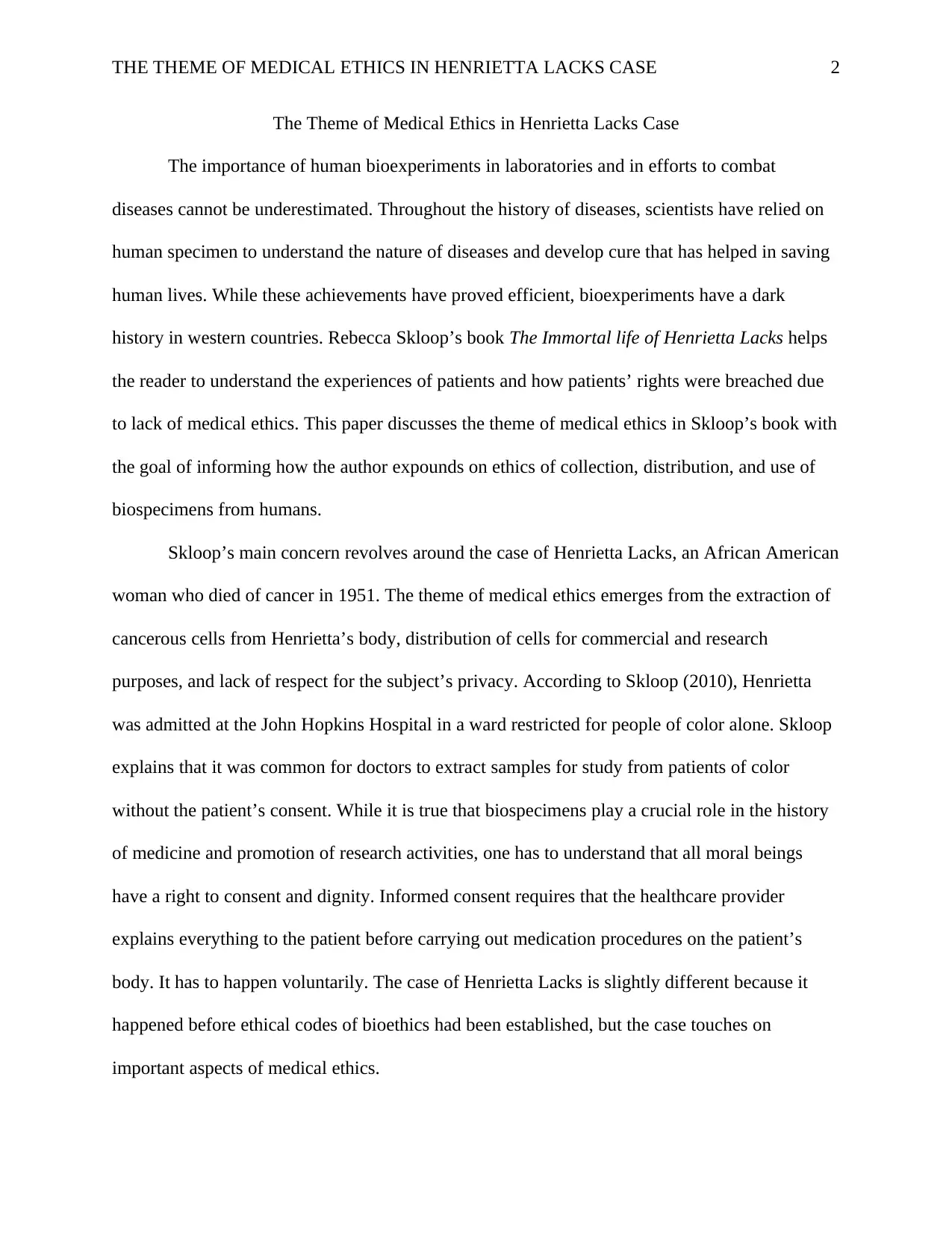
THE THEME OF MEDICAL ETHICS IN HENRIETTA LACKS CASE 2
The Theme of Medical Ethics in Henrietta Lacks Case
The importance of human bioexperiments in laboratories and in efforts to combat
diseases cannot be underestimated. Throughout the history of diseases, scientists have relied on
human specimen to understand the nature of diseases and develop cure that has helped in saving
human lives. While these achievements have proved efficient, bioexperiments have a dark
history in western countries. Rebecca Skloop’s book The Immortal life of Henrietta Lacks helps
the reader to understand the experiences of patients and how patients’ rights were breached due
to lack of medical ethics. This paper discusses the theme of medical ethics in Skloop’s book with
the goal of informing how the author expounds on ethics of collection, distribution, and use of
biospecimens from humans.
Skloop’s main concern revolves around the case of Henrietta Lacks, an African American
woman who died of cancer in 1951. The theme of medical ethics emerges from the extraction of
cancerous cells from Henrietta’s body, distribution of cells for commercial and research
purposes, and lack of respect for the subject’s privacy. According to Skloop (2010), Henrietta
was admitted at the John Hopkins Hospital in a ward restricted for people of color alone. Skloop
explains that it was common for doctors to extract samples for study from patients of color
without the patient’s consent. While it is true that biospecimens play a crucial role in the history
of medicine and promotion of research activities, one has to understand that all moral beings
have a right to consent and dignity. Informed consent requires that the healthcare provider
explains everything to the patient before carrying out medication procedures on the patient’s
body. It has to happen voluntarily. The case of Henrietta Lacks is slightly different because it
happened before ethical codes of bioethics had been established, but the case touches on
important aspects of medical ethics.
The Theme of Medical Ethics in Henrietta Lacks Case
The importance of human bioexperiments in laboratories and in efforts to combat
diseases cannot be underestimated. Throughout the history of diseases, scientists have relied on
human specimen to understand the nature of diseases and develop cure that has helped in saving
human lives. While these achievements have proved efficient, bioexperiments have a dark
history in western countries. Rebecca Skloop’s book The Immortal life of Henrietta Lacks helps
the reader to understand the experiences of patients and how patients’ rights were breached due
to lack of medical ethics. This paper discusses the theme of medical ethics in Skloop’s book with
the goal of informing how the author expounds on ethics of collection, distribution, and use of
biospecimens from humans.
Skloop’s main concern revolves around the case of Henrietta Lacks, an African American
woman who died of cancer in 1951. The theme of medical ethics emerges from the extraction of
cancerous cells from Henrietta’s body, distribution of cells for commercial and research
purposes, and lack of respect for the subject’s privacy. According to Skloop (2010), Henrietta
was admitted at the John Hopkins Hospital in a ward restricted for people of color alone. Skloop
explains that it was common for doctors to extract samples for study from patients of color
without the patient’s consent. While it is true that biospecimens play a crucial role in the history
of medicine and promotion of research activities, one has to understand that all moral beings
have a right to consent and dignity. Informed consent requires that the healthcare provider
explains everything to the patient before carrying out medication procedures on the patient’s
body. It has to happen voluntarily. The case of Henrietta Lacks is slightly different because it
happened before ethical codes of bioethics had been established, but the case touches on
important aspects of medical ethics.
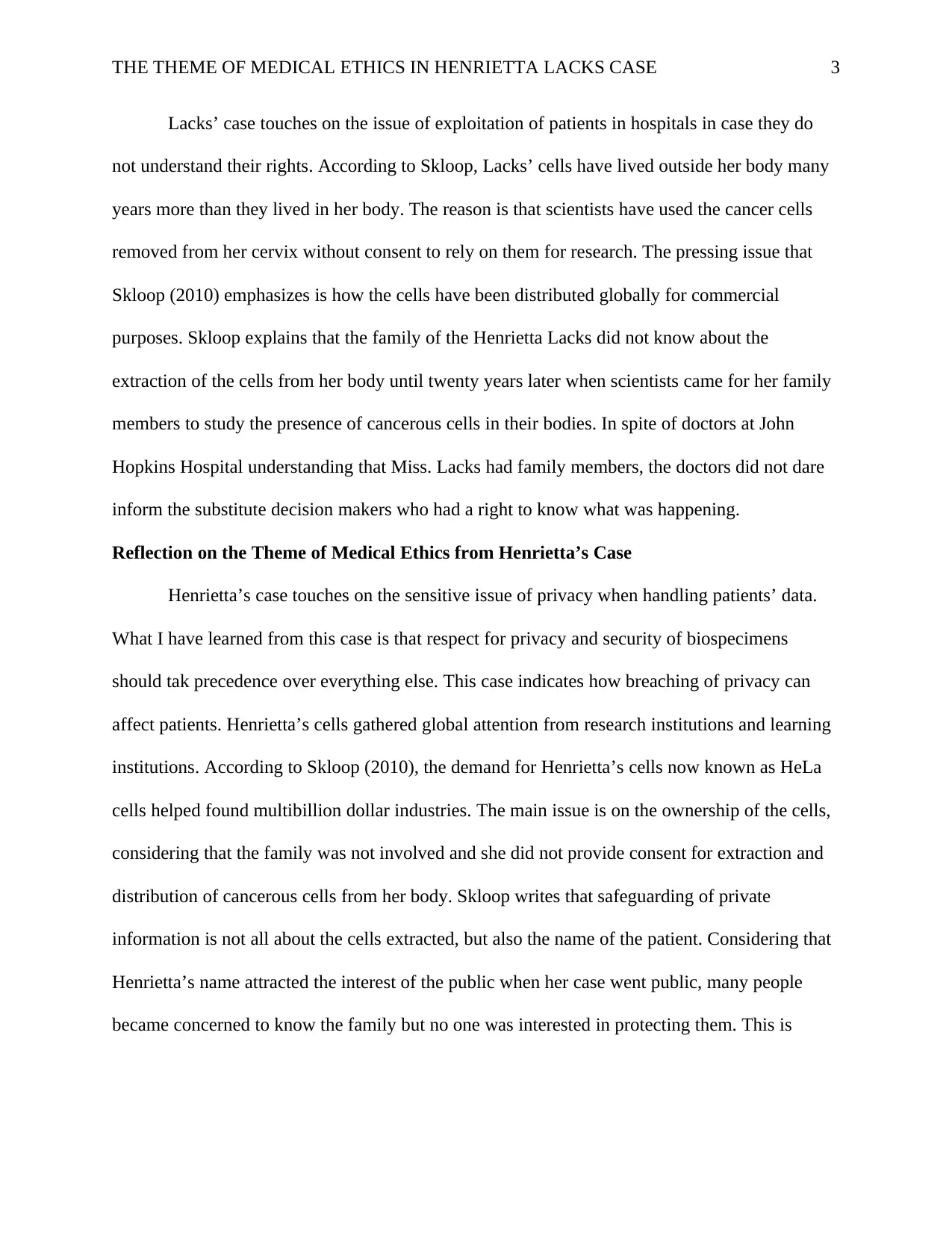
THE THEME OF MEDICAL ETHICS IN HENRIETTA LACKS CASE 3
Lacks’ case touches on the issue of exploitation of patients in hospitals in case they do
not understand their rights. According to Skloop, Lacks’ cells have lived outside her body many
years more than they lived in her body. The reason is that scientists have used the cancer cells
removed from her cervix without consent to rely on them for research. The pressing issue that
Skloop (2010) emphasizes is how the cells have been distributed globally for commercial
purposes. Skloop explains that the family of the Henrietta Lacks did not know about the
extraction of the cells from her body until twenty years later when scientists came for her family
members to study the presence of cancerous cells in their bodies. In spite of doctors at John
Hopkins Hospital understanding that Miss. Lacks had family members, the doctors did not dare
inform the substitute decision makers who had a right to know what was happening.
Reflection on the Theme of Medical Ethics from Henrietta’s Case
Henrietta’s case touches on the sensitive issue of privacy when handling patients’ data.
What I have learned from this case is that respect for privacy and security of biospecimens
should tak precedence over everything else. This case indicates how breaching of privacy can
affect patients. Henrietta’s cells gathered global attention from research institutions and learning
institutions. According to Skloop (2010), the demand for Henrietta’s cells now known as HeLa
cells helped found multibillion dollar industries. The main issue is on the ownership of the cells,
considering that the family was not involved and she did not provide consent for extraction and
distribution of cancerous cells from her body. Skloop writes that safeguarding of private
information is not all about the cells extracted, but also the name of the patient. Considering that
Henrietta’s name attracted the interest of the public when her case went public, many people
became concerned to know the family but no one was interested in protecting them. This is
Lacks’ case touches on the issue of exploitation of patients in hospitals in case they do
not understand their rights. According to Skloop, Lacks’ cells have lived outside her body many
years more than they lived in her body. The reason is that scientists have used the cancer cells
removed from her cervix without consent to rely on them for research. The pressing issue that
Skloop (2010) emphasizes is how the cells have been distributed globally for commercial
purposes. Skloop explains that the family of the Henrietta Lacks did not know about the
extraction of the cells from her body until twenty years later when scientists came for her family
members to study the presence of cancerous cells in their bodies. In spite of doctors at John
Hopkins Hospital understanding that Miss. Lacks had family members, the doctors did not dare
inform the substitute decision makers who had a right to know what was happening.
Reflection on the Theme of Medical Ethics from Henrietta’s Case
Henrietta’s case touches on the sensitive issue of privacy when handling patients’ data.
What I have learned from this case is that respect for privacy and security of biospecimens
should tak precedence over everything else. This case indicates how breaching of privacy can
affect patients. Henrietta’s cells gathered global attention from research institutions and learning
institutions. According to Skloop (2010), the demand for Henrietta’s cells now known as HeLa
cells helped found multibillion dollar industries. The main issue is on the ownership of the cells,
considering that the family was not involved and she did not provide consent for extraction and
distribution of cancerous cells from her body. Skloop writes that safeguarding of private
information is not all about the cells extracted, but also the name of the patient. Considering that
Henrietta’s name attracted the interest of the public when her case went public, many people
became concerned to know the family but no one was interested in protecting them. This is
⊘ This is a preview!⊘
Do you want full access?
Subscribe today to unlock all pages.

Trusted by 1+ million students worldwide
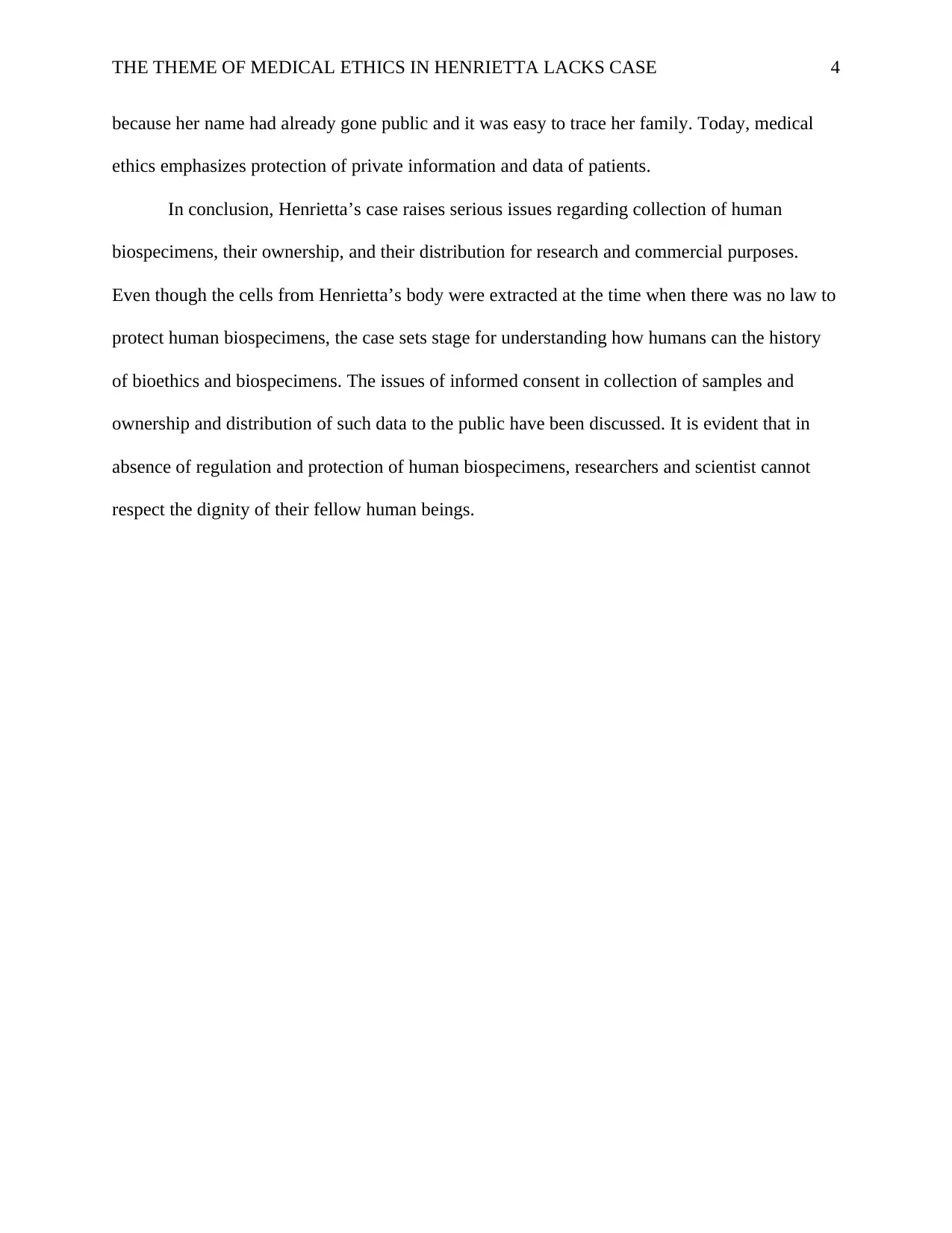
THE THEME OF MEDICAL ETHICS IN HENRIETTA LACKS CASE 4
because her name had already gone public and it was easy to trace her family. Today, medical
ethics emphasizes protection of private information and data of patients.
In conclusion, Henrietta’s case raises serious issues regarding collection of human
biospecimens, their ownership, and their distribution for research and commercial purposes.
Even though the cells from Henrietta’s body were extracted at the time when there was no law to
protect human biospecimens, the case sets stage for understanding how humans can the history
of bioethics and biospecimens. The issues of informed consent in collection of samples and
ownership and distribution of such data to the public have been discussed. It is evident that in
absence of regulation and protection of human biospecimens, researchers and scientist cannot
respect the dignity of their fellow human beings.
because her name had already gone public and it was easy to trace her family. Today, medical
ethics emphasizes protection of private information and data of patients.
In conclusion, Henrietta’s case raises serious issues regarding collection of human
biospecimens, their ownership, and their distribution for research and commercial purposes.
Even though the cells from Henrietta’s body were extracted at the time when there was no law to
protect human biospecimens, the case sets stage for understanding how humans can the history
of bioethics and biospecimens. The issues of informed consent in collection of samples and
ownership and distribution of such data to the public have been discussed. It is evident that in
absence of regulation and protection of human biospecimens, researchers and scientist cannot
respect the dignity of their fellow human beings.
Paraphrase This Document
Need a fresh take? Get an instant paraphrase of this document with our AI Paraphraser
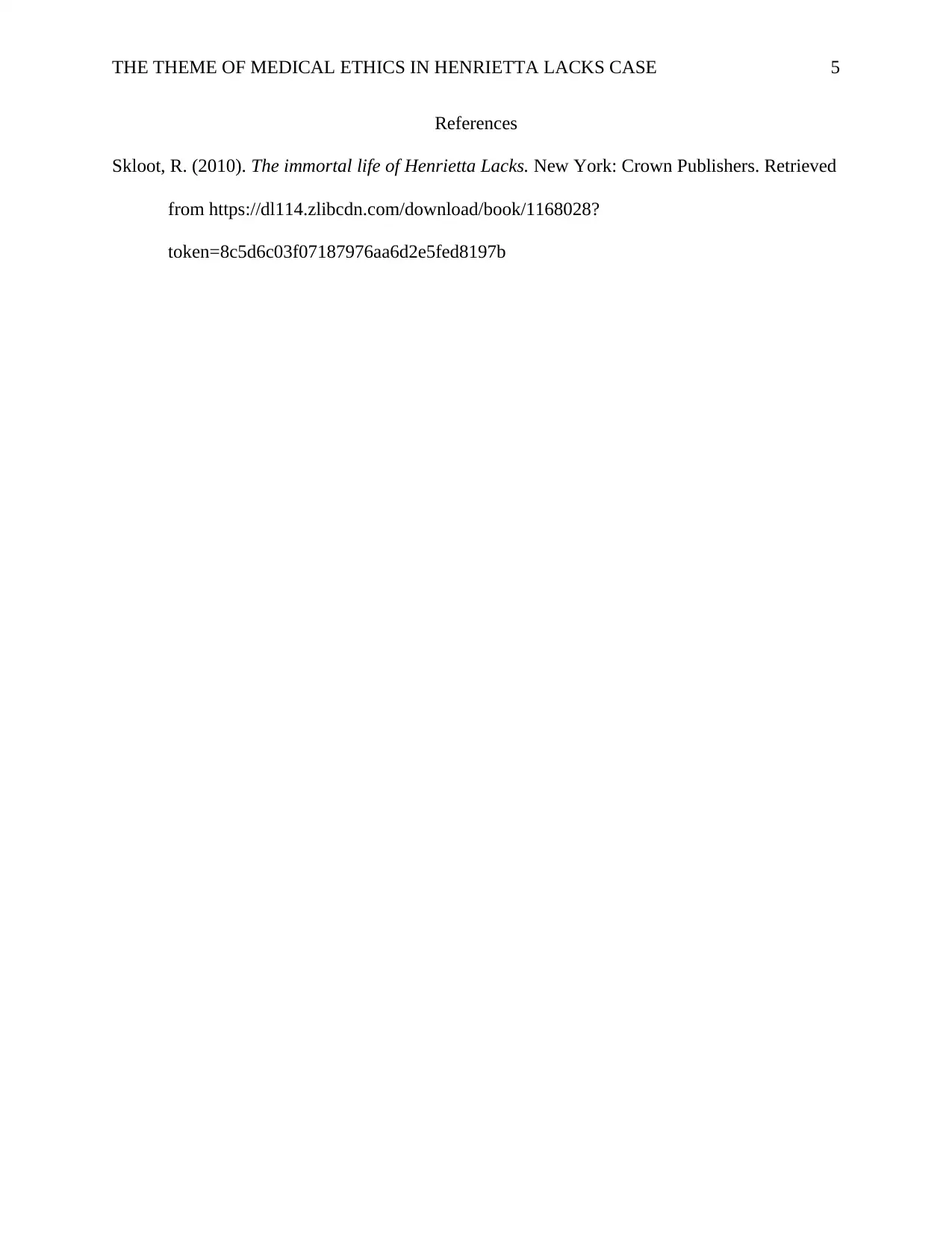
THE THEME OF MEDICAL ETHICS IN HENRIETTA LACKS CASE 5
References
Skloot, R. (2010). The immortal life of Henrietta Lacks. New York: Crown Publishers. Retrieved
from https://dl114.zlibcdn.com/download/book/1168028?
token=8c5d6c03f07187976aa6d2e5fed8197b
References
Skloot, R. (2010). The immortal life of Henrietta Lacks. New York: Crown Publishers. Retrieved
from https://dl114.zlibcdn.com/download/book/1168028?
token=8c5d6c03f07187976aa6d2e5fed8197b
1 out of 5
Related Documents
Your All-in-One AI-Powered Toolkit for Academic Success.
+13062052269
info@desklib.com
Available 24*7 on WhatsApp / Email
![[object Object]](/_next/static/media/star-bottom.7253800d.svg)
Unlock your academic potential
Copyright © 2020–2025 A2Z Services. All Rights Reserved. Developed and managed by ZUCOL.





